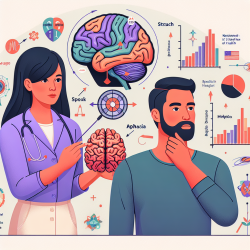Understanding Aphasia Diagnosis with the NIH Stroke Scale
In the realm of speech-language pathology, accurate diagnosis is crucial for effective intervention, especially when it comes to conditions like aphasia following a stroke. The research article "Accuracy of NIH Stroke Scale for Diagnosing Aphasia" by Grönberg et al. provides valuable insights into the efficacy of the National Institutes of Health Stroke Scale (NIHSS) in identifying aphasia in acute ischemic stroke patients.
Research Overview
The study conducted by Grönberg and colleagues examined the diagnostic accuracy of the NIHSS for detecting aphasia, a common language disorder resulting from stroke. The research involved 221 patients with acute first-ever ischemic stroke, assessed using the NIHSS and the comprehensive language screening test (LAST) as a reference standard.
The findings revealed that the NIHSS has a sensitivity of 72% and a specificity of 95% for diagnosing aphasia. While the NIHSS effectively identifies severe cases of aphasia, it may miss some mild cases, leading to false negatives. This highlights the importance of not solely relying on the NIHSS for guiding stroke treatment decisions.
Implications for Practitioners
For practitioners in the field of speech-language pathology, these findings underscore the necessity of a comprehensive assessment approach. Here are some actionable steps practitioners can take based on the research:
- Use Multiple Assessment Tools: Incorporate both the NIHSS and other language screening tools like LAST to ensure a thorough evaluation of language function in stroke patients.
- Be Cautious with Mild Cases: Recognize that mild aphasia may not be detected by the NIHSS alone. Consider additional testing or consultation with a speech-language pathologist for a more nuanced diagnosis.
- Educate and Advocate: Educate healthcare teams about the limitations of the NIHSS in diagnosing aphasia and advocate for comprehensive language assessments in stroke care protocols.
Encouraging Further Research
The study by Grönberg et al. opens avenues for further research to enhance aphasia diagnosis and treatment. Practitioners are encouraged to engage in ongoing research efforts to refine diagnostic tools and improve patient outcomes. Collaborative research initiatives can lead to the development of more sensitive and specific assessments for aphasia.
To read the original research paper, please follow this link: Accuracy of NIH Stroke Scale for diagnosing aphasia.










